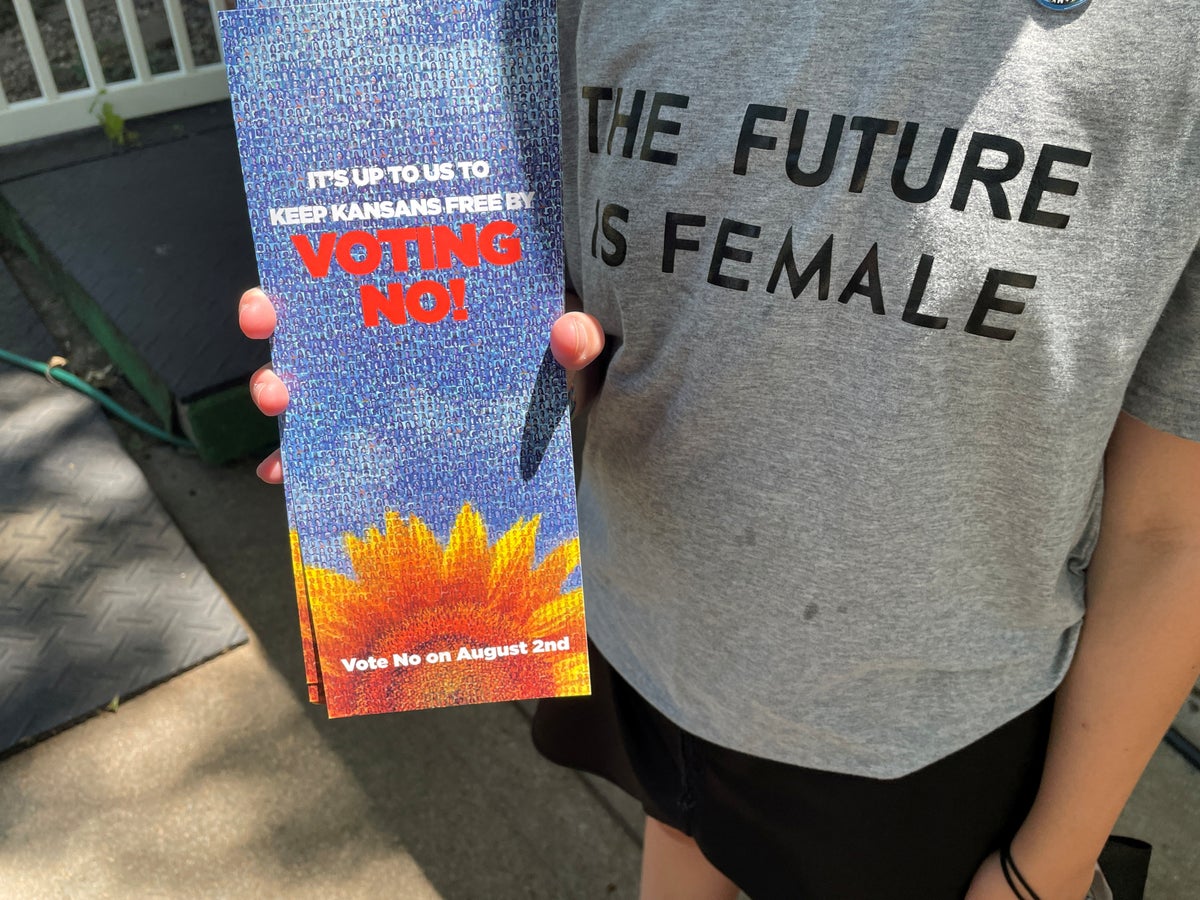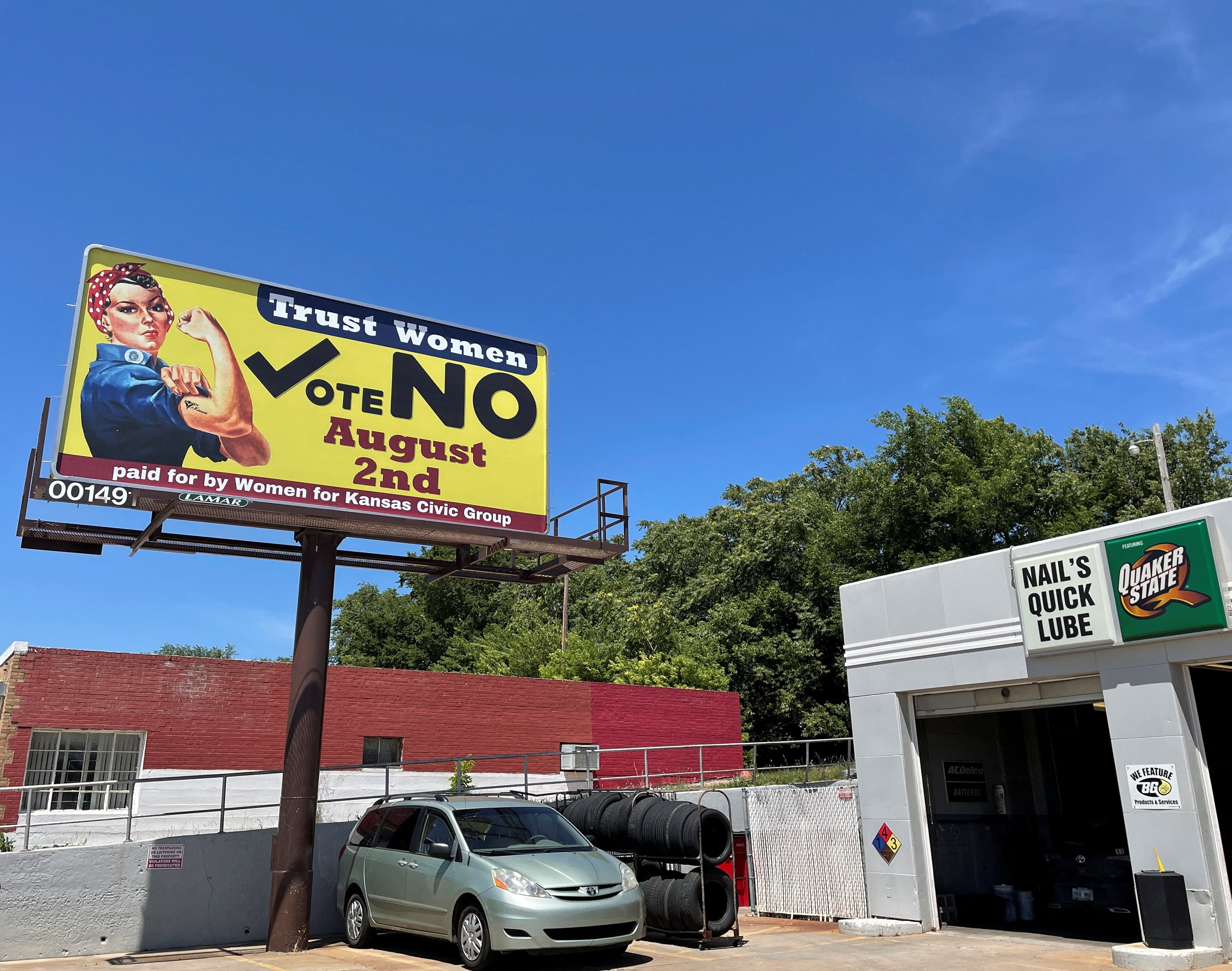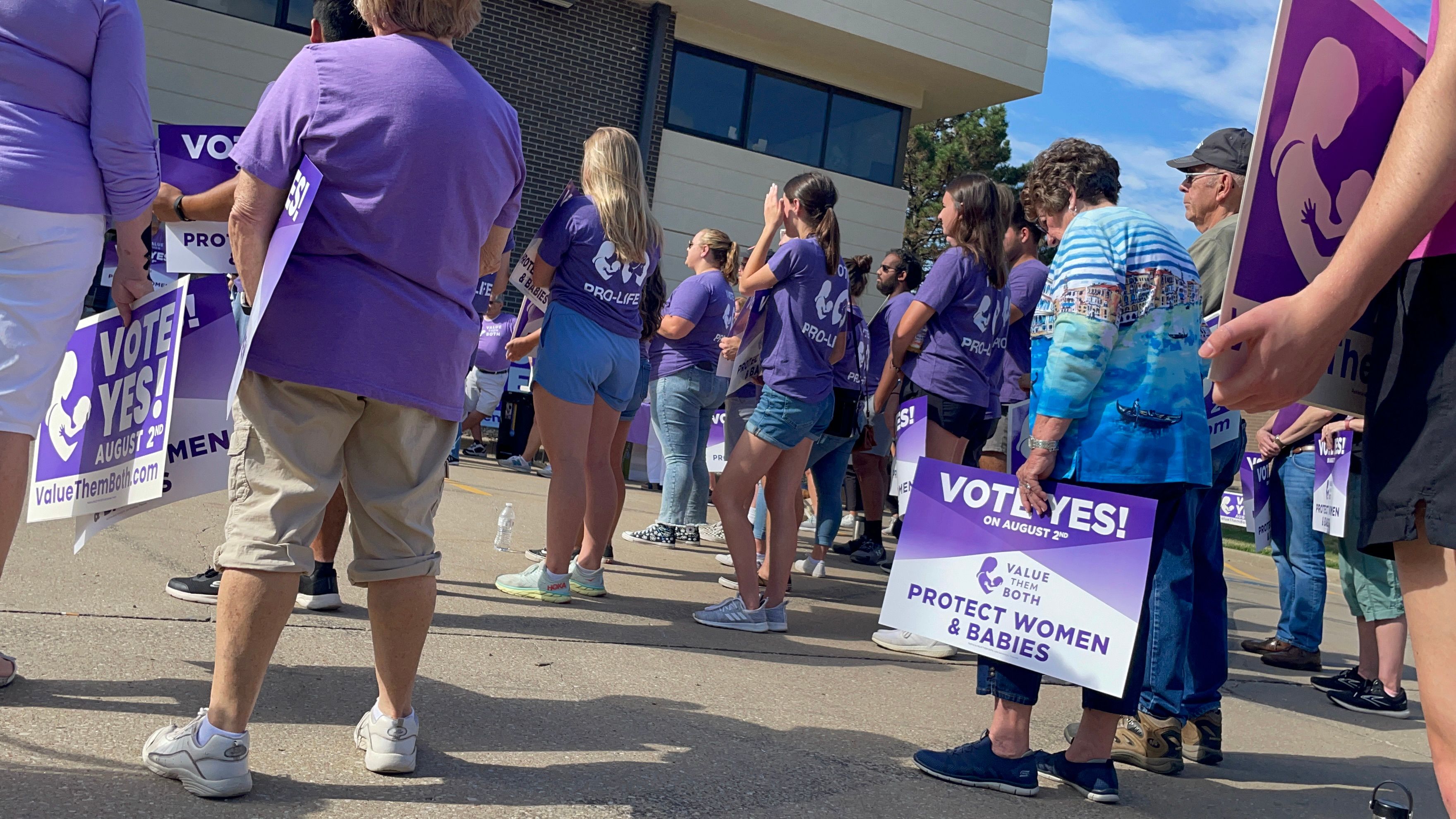
Voters in Kansas are the first in the US after the collapse of Roe v Wade to decide whether to protect the right to abortion care, a high-stakes test that could have a major impact on abortion access in the heart of the country.
The outcome of the election on 2 August will determine whether the state’s constitution explicitly denies the right to abortion access in Kansas. Anti-abortion state lawmakers are likely to pass severe restrictions on abortion care if the amendment passes.
One poll from co/efficient shows the election is likely to be close, with 47 per cent of primary voters saying they will support the amendment, 43 per cent of voters saying they plan to vote against it and 10 per cent undecided. Kansans are also evenly split on whether abortion should be legal, according to polling from the Pew Research Center.
“The work we’ve been doing – getting out there and canvassing, campaigning, doing voter outreach – has really confirmed for us ... that the majority of Kansans do agree that we should have legal access to abortion care,” said Zachary Gingrich-Gaylord, communications director for Trust Women, which operates a clinic in Wichita, in interview with The Independent.
“The challenge for us has always been to overcome the structural obstacles that are inherent in this state and this election.”
One anti-abortion coalition has amplified false election fraud conspiracy theories to demand that early-voting mail-in ballot drop boxes be removed, baselessly claiming that they could be manipulated.
Opponents of the amendment have also criticised the timing of the election – sharing a ballot with no other statewide Democratic elections – and the confusing language on the ballot itself. Voting “yes” supports revoking abortion rights, while voting “no” protects them. The ACLU of Kansas has also intervened in several voting rights cases across the state and received dozens of calls from confused voters.
Meanwhile, ads from anti-abortion groups are running emotional, inaccurate appeals. One called for the end the “gruesome practice of late-term abortion,” though third-trimester abortions are already banned in the state. Another anti-abortion billboard uses the phrase “trust women” – which is the name of the Trust Women clinic – and a third says “trust women” and “vote no”.
Millions of dollars from anti-abortion groups have poured into the anti-abortion Value Them Both coalition and anti-abortion campaigns, including support from Catholic dioceses across the state as well as the Kansas-Nebraska Convention of Southern Baptists.
Roughly 300 students with the anti-abortion Susan B Anthony Pro-Life America also traveled to the state to canvass in support of the amendment.
Kansans for Constitutional Freedom, a coalition of abortion rights advocates opposed to the amendment, raised more than $6.5m for a “vote no” campaign.
“We have seen, especially in the past few weeks, a groundswell of grassroots support in light of the Supreme Court decision,” Anamarie Rebori-Simmons, spokesperson for Planned Parenthood Great Plains Votes, told The Independent. “Kansans have really come together to realize that they don’t want this government overreach that they are seeing happening in their neighboring states. So that has been really imperative to our movement and to shedding light on this ballot initiative.”

More than twice as many voters cast their mail-in ballots during an early voting period ahead of the election compared to 2018, according to the Office of Kansas Secretary of State Scott Schwab.
In Douglas County, among a handful of Democratic-leaning strongholds in the state and home of the University of Kansas campus, more than 5,800 voters cast early in-person ballots – more than double the typical primary election turnout for the early voting period.
The anti-abortion movement, which has spent decades organising around the fall of Roe, casts a grim shadow in Kansas. Thousands of activists were once arrested outside the clinic of abortion provider Dr George Tiller during the “summer of mercy” in 1991, forcing clinics to shut down.
On 31 May, 2009, while he was serving as an usher at his church during a Sunday service, Dr Tiller was fatally shot by an anti-abortion activist.
A 2019 decision from the state’s Supreme Court determined that “personal autonomy” protections in the state constitution include abortion, enshrining the right of Kansans to seek an abortion, even in the event that the US Supreme Court struck down abortion rights.
But without any state-level constitutional protections for abortion access, the state’s Rebublican-dominated state legislature will introduce, and pass, severe anti-abortion restirictions similar to those that have been enacted across the US in recent weeks. Lest anyone forgot, the Supreme Court issued a landmark ruling in June in Dobbs v Jackson Women’s Health Organization, which revoked a constitutional right to abortion care, ending the half-century of precedent established under 1973’s Roe v Wade.
Notably, the state’s abortion rights-supporting Democratic Governor Laura Kelly, who has vetoed similar legislation passed by anti-abortion lawmakers, is up for re-election this fall. This potentially puts the fate of legal abortion care in the state – which has been a haven for legal abortion care as surrounding states have ended it – at risk.
There are five abortion clinics in Kansas, where abortion is legal up to 20 weeks of pregnancy. Though, roughly half of all abortions performed in the state in 2021 were among people who traveled from elsewhere, mostly neighbouring Missouri, where abortions are now illegal.
In the weeks after the Dobbs decision on 24 June, three of the four states served by Planned Parenthood Great Plains lost legal access to abortion. Before the ruling, Oklahoma lawmakers passed a series of severe anti-abortion laws, including a near-total ban on abortion punishable up to 10 years in prison. Anti-abortion laws in Missouri and Arkansas also went into effect in the Supreme Court’s aftermath.
“It’s been like a domino effect for us,” Ms Rebori-Simmons says.

Kansas – like many other states with narrow legal access to abortion – already has tight restrictions on abortion, including requirements that patients must undergo state-directed counseling and an ultrasound, a mandatory 24-hour waiting period, and bans on certain health insurance coverage and telemedicine appointments for medication abortion prescriptions.
“But Kansans have seen what happens when there is a total ban in neighboring states and the devastation that causes and, and recognize the government overreach,” Ms Rebori-Simmons says.
A leaked draft of the Supreme Court’s decision in the Dobbs case “helped to kind of start people thinking more closely about this election, and then of course the actual decision really did galvanize a lot of people, and made that made that real for people in ways that they could relate to and find a way into this conversation,” Mr Gingrich-Gaylord tells The Independent.
“It’s very easy to dismiss these states in these regions is like, ‘You know, they voted for themselves’, or whatever. ‘They get what they vote for’. But I think the existence of a reproductive health care clinic in any of these states is proof that that’s just not true,” he says. “The majority of people agree that people should have access to reproductive health care, that the government should not be making decisions about that for people. The problem is that … the power in this state has become so disconnected from the people.”







